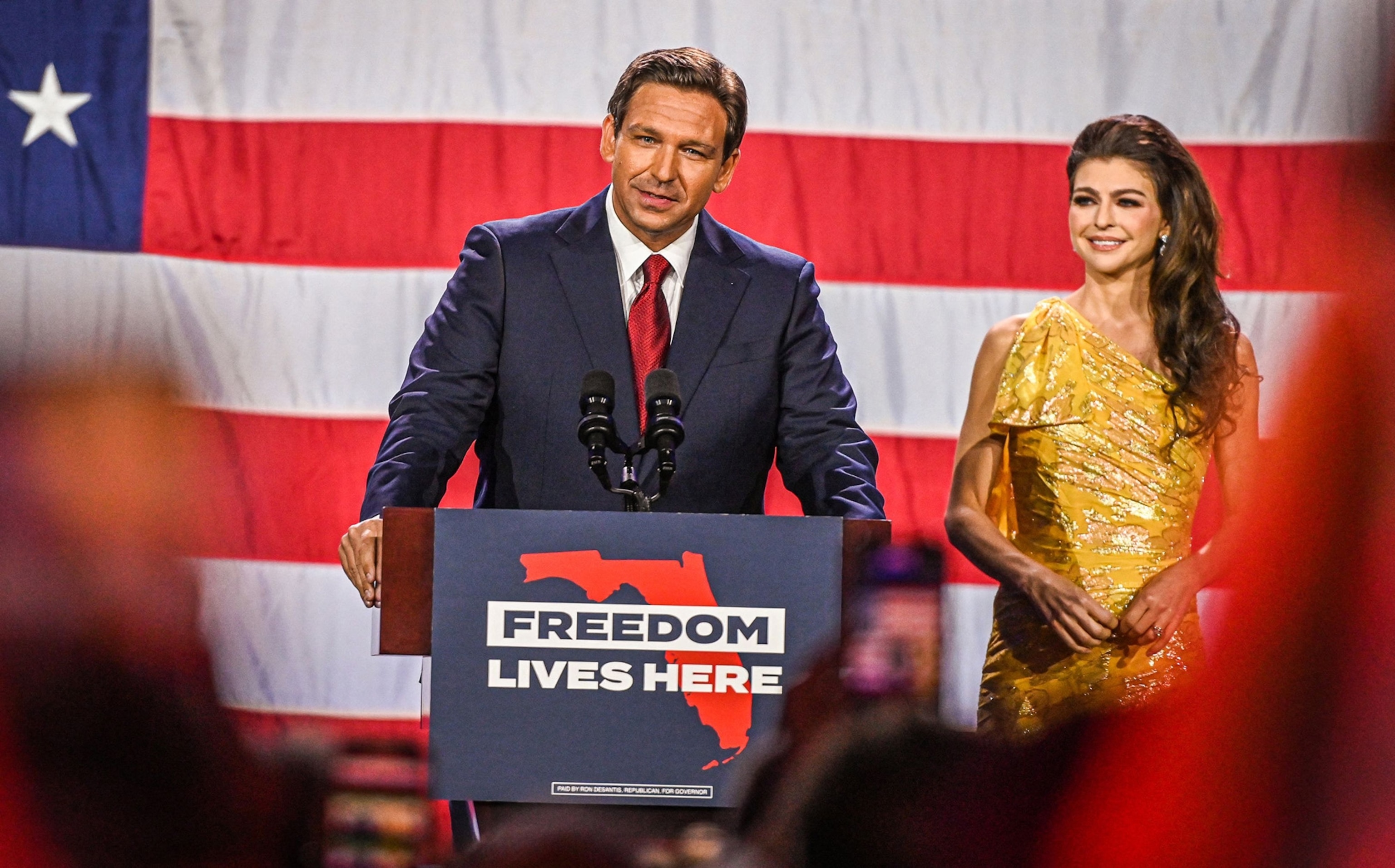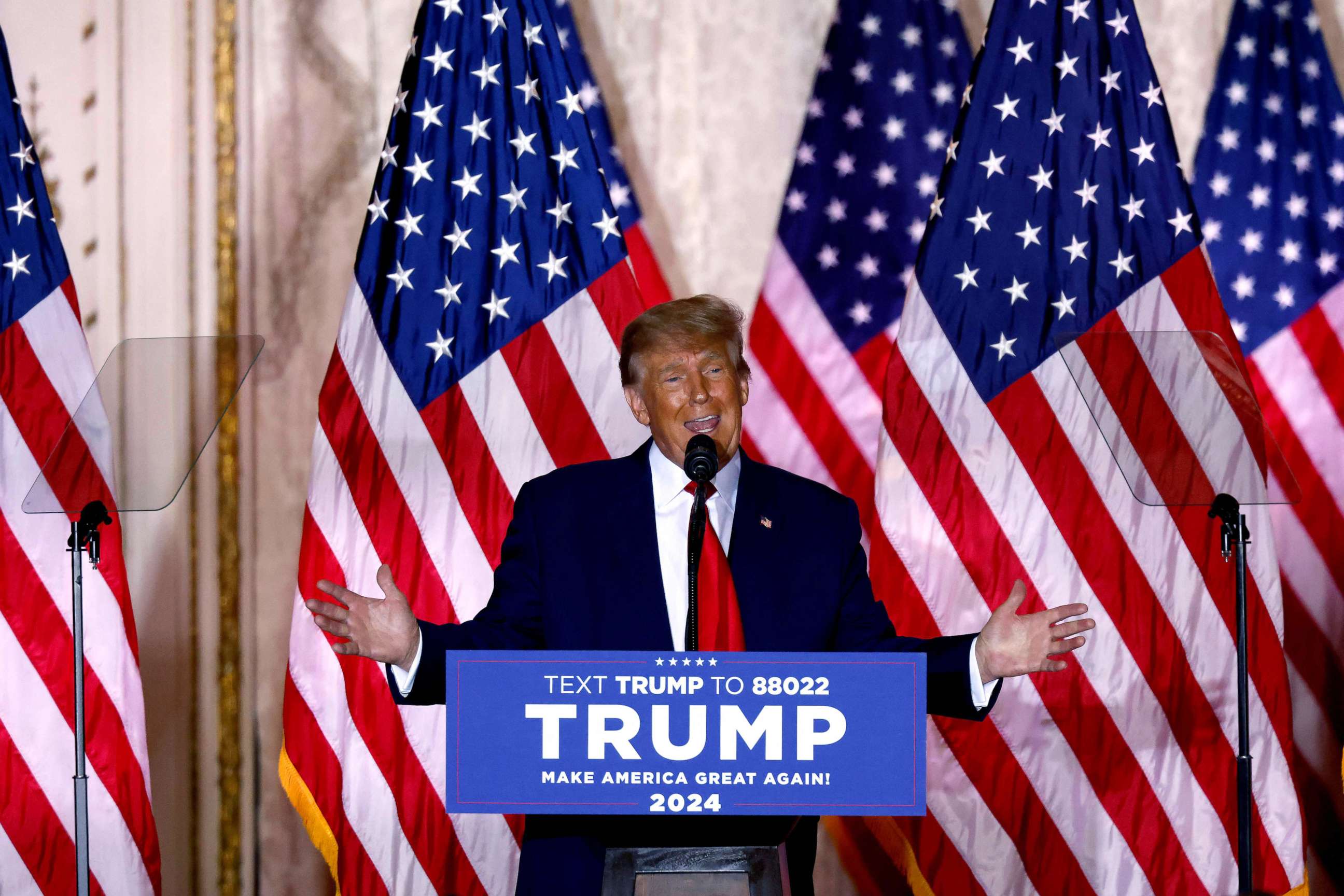Trump's very early 2024 announcement likely won't stop a GOP primary fight: Strategists
His "subdued" speech at Mar-a-Lago was embraced by some and dismissed by others.
Former President Donald Trump launched his third White House campaign Tuesday evening, getting a very early head start in the next election cycle that could see challenges from, by some predictions, nearly a dozen other Republicans looking to oust him as the head of the GOP.
According to preliminary assessments by aides and observers in the party, the 2024 dynamic is likelier to seem more like 2016's months-long primary fight -- with its quarreling campaigns and competing headlines -- than 2020's glide to re-coronation.
While Trump enters the race as the front-runner for the 2024 GOP nomination, Republican operatives said they expect he won't have the primary field to himself for long, given his mixed track record at the ballot box and his personal and legal baggage.
One GOP strategist allied with a potential primary challenger said Trump's Tuesday announcement speech at his Mar-a-Lago resort -- in which he promised "America's comeback starts right now" -- was "not anything that would discourage people from thinking about running against him."
"He was subdued, he was on topic, he stayed on teleprompter. As far as what I would consider a dynamic announcement, I didn't see much there," said the person, who, like others, agreed to be interviewed for this story on the condition of anonymity so as to not direct ire to their professional relationships.
In roughly hour-long remarks, Trump portrayed his one term in office as a "golden age" and periodically alluded to a message of teamwork while contending that successor Joe Biden, whom Trump had sought to prevent from taking office, had brought "pain, hardship, anxiety and despair."
Trump also occasionally veered into conspiracy theories, including about China, while returning to some frequent topics like what he called the scourge of drug dealers, widespread immigration and "rotting" cities turned into "cesspools of blood." He touted his own style of international relations and his handling of the economy compared to Biden.
"If you were a pro-Trump person, you loved it. And if you were an undecided, it didn't move you," the strategist said. "And if you were somebody that didn't like him, that didn't change your mind."

The setting, at a ballroom at his club, marked a departure from Trump's typically boisterous campaign rallies that often toggle between prepared remarks on policy and stream-of-consciousness comments on the controversy du jour.
He also stayed away from cultural third rails like abortion after three Supreme Court justices he appointed helped scrap constitutional protections, fulfilling a promise Trump made to Republican voters during his previous two runs. And he made only a passing reference to the 2020 presidential race after election deniers in top midterm races fell short and exit polls indicated that midterm voters punished the party for its support of such views.
"He needed to show voters that he properly understands the stakes in 2024, and I think his speech accomplished that," said another GOP strategist, who added that Trump has "got to show that he has the ability to look forward."
Some allies of the former president swiftly announced their endorsement of his new bid, with House GOP Conference Chair Elise Stefanik of New York voicing her support before he even made his speech.
"Yeah, 100%," Sen. Tommy Tuberville, R-Ala., said Wednesday when asked if he backed Trump's 2024 campaign. "I look at winning and losing. He won while he was here. He helped the American people. And I like his policies. I like how tough he is. We need a president that's gonna stand up, be tough, not just domestically but internationally. And he does that."
Still, the speech's tone didn't please everyone in the party, with one Trump ally saying they were "bored," while others cast doubt on whether Trump, famous for his reputation for riling up the grassroots, would maintain a restrained pitch.
"For all the people who claim they are turned off by his bombastic style, it's ironic they are now complaining he's too focused and toned down," said one former administration official, who still conceded it was "doubtful" that Trump would remain as subdued moving forward.
And while Trump enters the race with a high floor of support with the Republican primary electorate, plenty of money and nearly universal name recognition, strategists expected he'll still have to fight for the GOP nomination.
Among those thought to be considering presidential bids of their own are Govs. Ron DeSantis, R-Fla., Asa Hutchinson, R-Ark., Larry Hogan, R-Md., Kristi Noem, R-S.D., and Glenn Youngkin, R-Va., former Vice President Mike Pence, former Secretary of State Mike Pompeo and Sens. Josh Hawley, R-Mo., and Tim Scott, R-S.C.
Some may yet be dissuaded from running against Trump given his sway, though there have been indications the former president's hold on the party is not as ironclad as it once was, particularly after the disappointing midterm cycle for Republicans in which some of his chosen candidates in marquee races lost -- helping Democrats defy historical patterns and hold the Senate.
The Club for Growth, the anti-tax group that used to be close with the former president, released polls the day before Trump's launch showing him trailing DeSantis in key states. And The New York Post, a conservative tabloid that lavished Trump with praise for years, buried news of his launch on page 26 on Wednesday with the headline "FLORIDA MAN MAKES ANNOUNCEMENT."

Other potential contenders have also indicated their plans aren't being adjusted in light of Trump's launch.
Pence in recent days has insisted in media interviews that there are "better options," while Pompeo tweeted on Wednesday that "we need more seriousness, less noise, and leaders who are looking forward, not staring in the rearview mirror claiming victimhood" after Trump called himself a "victim" over various investigations.
"I do think that over the coming weeks, multiple candidates are going to announce," said John Thomas, the head of a pro-DeSantis super PAC. "I think the next five to 10 days are going to be telling to see if cracks begin to emerge, and those cracks may turn into canyons and end up causing the former president to lose a primary."
Still, strategists warned against underestimating Trump, who emerged as the 2016 Republican nominee after a chaotic primary and went on to win the White House despite late-breaking scandals like the "Access Hollywood" tape.
And should the GOP field get crowded for 2024, strategists said that could simply help Trump repeat his 2016 success in which he won the nomination with a plurality of the vote while the rest of the party's delegates were divided among a crowd so large that it required two debate stages.
"It will be incredibly hard if everybody gets in line with the president for anybody to challenge him," Thomas said.
More immediately, Trump's announcement has thrown the end of the current midterm cycle into uncertainty, with his candidacy possibly firing up both parties' bases ahead of next month's Georgia Senate runoff.
Republicans are eager for Herschel Walker to unseat Democratic Sen. Raphael Warnock to keep the Senate at 50-50, creating some procedural obstacles for the majority party, while Democrats are hopeful that Warnock could win, bumping up their caucus to 51-49.
It's still unclear if Trump intends to campaign for Walker -- which the Republicans who spoke for this story said they don't want after his involvement in last year's two Georgia Senate runoffs preceded losses in both races.
"I just think it reminds people that he's out there and with the Senate not being in the balance, it's going to be even harder to get voters out to vote," said Georgia conservative radio host Martha Zoller. "And I think that's true for Democrats and Republicans."




